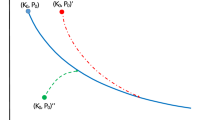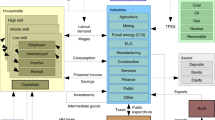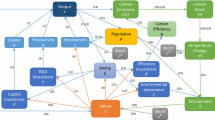Abstract
Global warming (GW) is now recognized as a significant threat to sustainable development on an international scale. After providing some introductory background material, we introduce a benchmark dynamic game within which to study the GW problem. The model allows for population growth and is subsequently generalized to allow for changes in technology. In each case, a benchmark “Business as Usual” (BAU) equilibrium is analyzed and contrasted with the efficient solution. Furthermore, a complete characterization is provided in the benchmark model of the entire subgame perfect equilibrium value correspondence.
Similar content being viewed by others
References
Barrett S. (2003). Environment and statecraft: the strategy of environmental treaty-making. Oxford University Press, Oxford
Benhabib J., Radner R. (1992). Joint exploitation of a productive asset. Econ Theory 2:155–190
Bradford D.F. On the uses of benefit-cost reasoning in choosing policy toward global climate change. Working Paper 127, Center of Economic Studies, University of Munich (1997) (unpublished)
Cline W.R. (1992). The economics of global warming. Institute for International Economics, Washington, DC
Dasgupta S., Mitra T. (1999). On the welfare significance of national product for economic growth and sustainable development. J Econ Rev 50(4):422–442
Dutta, P.K., Radner, R.: A strategic analysis of global warming: theory and some numbers. (2004a) (under submission)
Dutta P.K., Radner R. Self-enforcing climate change treaties. In: Proceedings of the National Academy of Sciences, USA, 2004, vol. 101–14, pp.~5174–5179 (2004b)
Dutta, P.K., Radner, R.: Choosing cleaner technologies: global warming and technological change. In preparation (2004c)
Dutta, P.K., Sundaram, R.K.: The equilibrium existence problem in general markovian games. Deptartment of Economics, Columbia U., January 1996. To appear in Majumdar, M.K. Organizations with incomplete information: (ed.), Cambridge: Cambridge University Press 1998
Finus, M.: Game theory and international environmental cooperation. Edward Elgar 2001
Grubler A., Fujii Y. (1991). Intergenerational and spatial equity issues of carbon accounts. Energy 16:1397–1416
Heal G.M. (2000). Valuing the future: economic theory and sustainability. Columbia University Press, New York
Radner R. (1991). Dynamic games in organization theory. J Econ Behav Organ 16:217–260
Thomson D.J. (1997). Dependence of global temperatures on atmospheric CO2 and solar irradiance. Proc Nat Acad Sci USA 94:8370–8377
Weitzman, M.L.: Sustainability and the welfare significance of national product revisited. Discussion Paper 1737, Harvard Institute of Economic Research Harvard University, September 1995 (unpublished)
Author information
Authors and Affiliations
Corresponding author
Additional information
JEL Classification Q54, D99, O12
This paper builds on the Woytinsky Lecture delivered by Roy Radner at the University of Michigan, March 11, 1998. We would like to thank Graciela Chichilnisky, Arnulf Grubler, Geoffrey Heal, Leonid Hurwicz, Jill Jaeger, Peter de Janosi, Paul Kleindorfer, Giuseppe Lopomo, Thomas Schelling, Tapan Mitra, and Michael Toman for helpful discussions and references, and Andrew King, Charlotte V. Kuh, and Frank Sinden for comments on an earlier draft. In the case of the present enterprise, much of whose scope lies outside of our previous expertise, it is even more important than usual to emphasize that we are responsible for all errors.
Rights and permissions
About this article
Cite this article
Dutta, P.K., Radner, R. Population growth and technological change in a global warming model. Economic Theory 29, 251–270 (2006). https://doi.org/10.1007/s00199-005-0056-4
Received:
Accepted:
Published:
Issue Date:
DOI: https://doi.org/10.1007/s00199-005-0056-4




